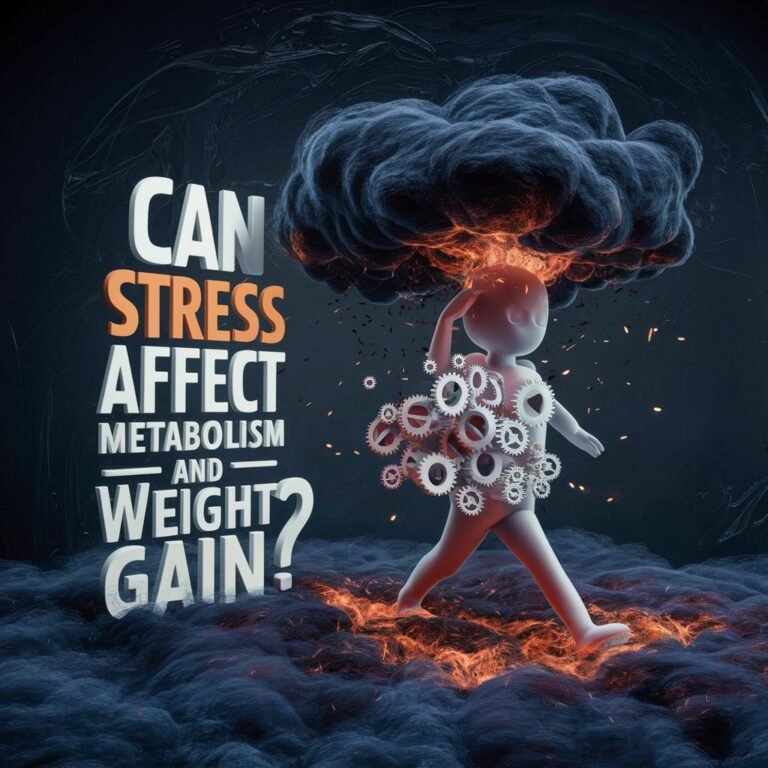Can Stress Affect Metabolism and Weight Gain?
Stress is an inevitable part of modern life, but its impact on our bodies extends far beyond just feeling overwhelmed. One area where stress can have a significant effect is on our metabolism and weight. In this comprehensive article, we’ll explore the intricate relationship between stress, metabolism, and weight gain, delve into the latest scientific research, and provide evidence-based strategies to manage stress for better metabolic health.
The Science Behind Stress and Metabolism
When we experience stress, our bodies release a cascade of hormones, primarily cortisol and adrenaline. These hormones are part of our “fight or flight” response and can have several effects on our metabolism:
- Increased blood sugar levels
- Slowed digestion
- Changes in appetite
- Altered fat storage
- Increased heart rate and blood pressure
- Suppressed immune function
Did You Know?
Cortisol, often called the “stress hormone,” can increase appetite and cravings for high-calorie foods. This evolutionary response was designed to help our ancestors survive periods of danger by storing energy, but in our modern world, it can contribute to weight gain.
How Stress Can Lead to Weight Gain
Chronic stress can contribute to weight gain through several mechanisms:
- Increased cortisol levels: Cortisol can promote fat storage, especially around the abdomen. This type of fat, known as visceral fat, is particularly harmful to health.
- Emotional eating: Many people turn to food as a coping mechanism for stress, often choosing high-calorie “comfort foods”.
- Disrupted sleep: Stress can interfere with sleep, which is crucial for maintaining a healthy metabolism. Poor sleep is associated with hormonal imbalances that can increase appetite and cravings.
- Reduced motivation for physical activity: When stressed, we may be less likely to exercise regularly, further impacting our metabolic health.
- Insulin resistance: Chronic stress can lead to insulin resistance, making it harder for our bodies to process sugars effectively.
The Stress-Weight Gain Cycle
Stress and weight gain can often form a vicious cycle. As stress leads to weight gain, individuals may become more stressed about their weight, leading to further metabolic disruptions. Understanding this cycle is key to breaking it.
Breaking the Stress-Weight Gain Cycle
Managing stress is key to maintaining a healthy metabolism and weight. Here are some evidence-based strategies to help break the cycle:
1. Practice Stress-Reduction Techniques
- Meditation and mindfulness
- Deep breathing exercises
- Yoga or tai chi
- Progressive muscle relaxation
Research shows that regular meditation can lower cortisol levels and reduce stress-related eating behaviors.
2. Regular Exercise
Physical activity can help reduce stress and boost metabolism. Aim for at least 150 minutes of moderate-intensity exercise per week. Exercise has been shown to:
- Reduce cortisol levels
- Improve insulin sensitivity
- Boost mood and reduce anxiety
- Enhance sleep quality
3. Maintain a Balanced Diet
Focus on whole foods, lean proteins, and plenty of fruits and vegetables. Avoid excessive caffeine and sugar, which can exacerbate stress. Consider incorporating these stress-busting foods:
- Fatty fish rich in omega-3s (salmon, mackerel)
- Complex carbohydrates (whole grains, sweet potatoes)
- Magnesium-rich foods (leafy greens, nuts, seeds)
- Probiotic foods for gut health (yogurt, kefir, sauerkraut)
4. Prioritize Sleep
Aim for 7-9 hours of quality sleep per night to help regulate stress hormones and metabolism. Improve your sleep hygiene by:
- Maintaining a consistent sleep schedule
- Creating a relaxing bedtime routine
- Limiting screen time before bed
- Ensuring your bedroom is dark, quiet, and cool
Advanced Insights on Stress and Metabolism
The HPA Axis and Metabolism
The Hypothalamic-Pituitary-Adrenal (HPA) axis plays a crucial role in stress response and metabolism. Chronic stress can dysregulate this axis, leading to hormonal imbalances that affect metabolism. Recent research has shown that HPA axis dysfunction can contribute to:
- Increased visceral fat accumulation
- Alterations in thyroid function
- Changes in glucose metabolism
Epigenetics and Stress
Recent research suggests that chronic stress can lead to epigenetic changes – modifications in gene expression without altering the DNA sequence. These changes can affect metabolism and even be passed down to future generations. Studies have found that:
- Stress can alter DNA methylation patterns in genes related to metabolism
- These epigenetic changes can persist long after the stressful event has passed
- Some stress-induced epigenetic modifications may be reversible through lifestyle interventions
The Role of Gut Microbiome
Stress can alter the composition of gut bacteria, which plays a significant role in metabolism and weight regulation. Maintaining a healthy gut microbiome through diet and stress management may help support metabolic health. Recent findings include:
- Stress can reduce beneficial bacteria and increase harmful bacteria in the gut
- Changes in gut microbiome can affect how we metabolize food and store fat
- Probiotics and prebiotics may help mitigate stress-induced changes in gut bacteria
Fascinating Fact
Research has shown that chronic stress can actually change the size and structure of the brain, particularly in areas involved in memory and emotional regulation. These changes can further impact our ability to manage stress and maintain healthy eating habits.
The Impact of Different Types of Stress on Metabolism
Not all stress is created equal when it comes to its effects on metabolism. Let’s explore how different types of stress can impact our body’s energy balance:
Acute Stress
Short-term or acute stress can actually have some positive effects on metabolism. It can:
- Temporarily boost metabolism
- Enhance focus and cognitive function
- Improve short-term memory
However, frequent bouts of acute stress can eventually lead to chronic stress if not managed properly.
Chronic Stress
Long-term or chronic stress is where the real metabolic problems begin. Chronic stress can lead to:
- Persistent elevation of cortisol levels
- Increased insulin resistance
- Disruption of thyroid function
- Decreased muscle mass and increased fat storage
Psychological vs. Physical Stress
While both types of stress can impact metabolism, they may do so in slightly different ways:
- Psychological stress (e.g., work pressure, relationship issues) tends to increase emotional eating and disrupt sleep patterns
- Physical stress (e.g., intense exercise, illness) can increase metabolic rate! in the short term but may lead to burnout if prolonged
Hormones, Stress, and Metabolism: A Complex Interplay
The relationship between stress and metabolism is largely mediated by hormones. Let’s take a closer look at some key players:
Cortisol
Often called the “stress hormone,” cortisol plays a crucial role in:
- Regulating blood sugar levels
- Controlling inflammation
- Influencing fat, protein, and carbohydrate metabolism
While short-term increases in cortisol can be beneficial, chronic elevation can lead to weight gain, particularly around the abdomen.
Insulin
Stress can impact insulin sensitivity, potentially leading to:
- Increased blood sugar levels
- Greater fat storage
- Increased risk of type 2 diabetes over time
Leptin and Ghrelin
These “hunger hormones” can be disrupted by stress:
- Leptin, which signals fullness, can become less effective
- Ghrelin, which stimulates appetite, may increase
This hormonal imbalance can lead to overeating and weight gain.
Thyroid Hormones
Chronic stress can suppress thyroid function, leading to:
- Decreased metabolic rate
- Fatigue and weight gain
- Mood disturbances
Hormonal Insight
The balance between these hormones is delicate and interconnected. For example, high cortisol levels can lead to insulin resistance, which in turn can affect leptin sensitivity, creating a cascade of metabolic disruptions.
Innovative Stress Management Techniques for Metabolic Health
While traditional stress management techniques are valuable, emerging research has highlighted some innovative approaches:
1. Forest Bathing (Shinrin-Yoku)
This Japanese practice involves immersing oneself in nature. Studies have shown it can:
- Reduce cortisol levels
- Lower blood pressure
- Improve overall well-being
2. Sound Therapy
Using specific sound frequencies, such as binaural beats or nature sounds, can:
- Induce relaxation
- Improve sleep quality
- Reduce stress-related symptoms
3. Cold Exposure
Controlled exposure to cold, such as cold showers or ice baths, may:
- Boost metabolism
- Reduce inflammation
- Improve stress resilience
4. Nutrigenomics
This emerging field examines how nutrients interact with our genes. Personalized nutrition based on genetic testing may help:
- Optimize stress response
- Improve metabolic efficiency
- Tailor dietary recommendations for better health outcomes
Frequently Asked Questions
Conclusion
The relationship between stress, metabolism, and weight gain is complex and multifaceted. While stress can certainly impact our metabolic health and contribute to weight gain, understanding these connections empowers us to take control. By implementing stress-management techniques, maintaining a balanced lifestyle, and staying informed about the latest research, we can work towards better metabolic health and overall well-being.
Remember, everyone’s stress response and metabolism are unique. What works for one person may not work for another. It’s important to experiment with different strategies and, if necessary, work with healthcare professionals to develop a personalized plan for managing stress and optimizing metabolic health.
By taking a proactive approach to stress management and metabolic health, we can not only prevent weight gain but also improve our overall quality of life, boost our energy levels, and enhance our resilience to future stressors.
Explore Our Comprehensive Stress Management Tools
